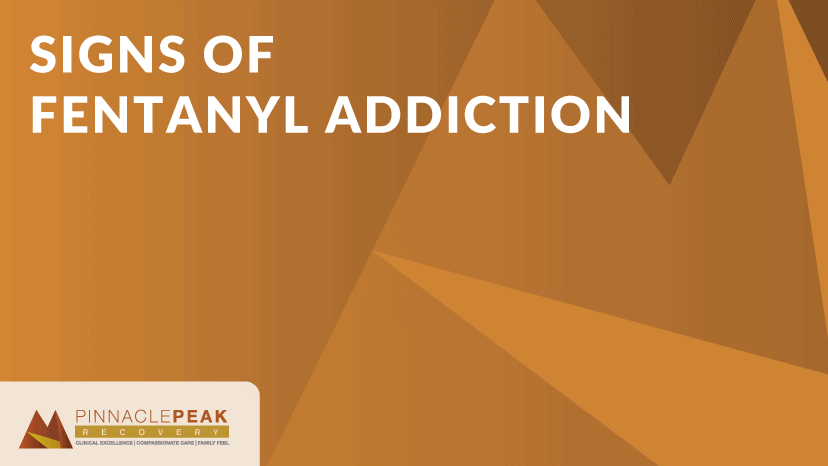According to the Arizona Criminal Justice Commission, fentanyl is the most common opioid to cause an overdose in Arizona. Arizona residents may worry about their friends or family being involved in fentanyl use. However, it can be difficult for the untrained eye to identify who is and who is not using fentanyl. If you suspect someone is using fentanyl, our article will give you insight into the common signs to look for. The good news is fentanyl treatment is available and can help you or your loved one recover and achieve wellness!
Signs of Fentanyl Use Disorder on the Body and Mind
Fentanyl is a synthetic opioid substance. It was initially developed to treat patients experiencing severe chronic pain. Fentanyl is a powerful opioid and has become popular as an illicit substance. Many signs of fentanyl use are easily observable for those informed about what to look for.
Behavioral Signs of Fentanyl Abuse
Fentanyl use can lead to a person developing a substance use disorder. This means substance use is causing a significant impairment for a person. This impairment can include health problems or failure to attend to significant life responsibilities. Someone with substance use disorder will find it challenging to end substance use, even in the face of these impairments. It will often lead to someone prioritizing substance use above all else. Someone struggling with substance use disorder may isolate themselves from others.
Psychological Changes
There are many psychological changes to look for when determining if someone may be using fentanyl. Common examples include:
- Confusion
- Preoccupation with substance use
- Sleep problems
- Difficulty focusing
- Cravings
- Impaired memory
- Suicidal thoughts
Physical Changes
Physical changes are the most noticeable symptoms of fentanyl use. Common physical symptoms of fentanyl use are:
- Slow breathing
- Irregular heartbeat
- Digestive issues
- Nausea and vomiting
- Flushed skin
- Sweating
- Hot flashes
- Weight loss
- Shaking
- Hives
- Rash
- Itching
- Seizures
What Is Drug-Seeking Behavior?
Drug-Seeking behavior is a common phrase used to describe the behaviors exhibited by someone who suffers from substance use disorder and is attempting to obtain substances. Often, those in this position utilize manipulative and demanding behaviors. For example, a person may insist that fentanyl is the only substance that brings them relief, and they must have it. They may also insist that non-opioid medications are ineffective. If a doctor does not prescribe fentanyl, they may seek a different doctor and attempt to get that doctor to prescribe the substance. They may also resort to stealing family members’ prescription medications or obtaining illicit fentanyl.
Withdrawal Symptoms and Other Side Effects
Fentanyl withdrawal is rarely fatal. Withdrawal from fentanyl is usually described as a bad case of the flu. However, it can be unpleasant and challenging to endure fentanyl withdrawal. Therefore, it is recommended to experience withdrawal in a licensed treatment facility where a person can be made comfortable, receive treatment for symptoms of withdrawal, and will have no access to fentanyl. Some of the withdrawal symptoms a person can expect to experience are:
- Yawning
- Runny nose
- Watery eyes
- Anxiety
- Disturbed mood
- Pain
- Chills
- Sweating
- Goosebumps
- Stomach cramps
- Nausea and vomiting
- Diarrhea
- Muscle cramps
- Joint pain
- Disturbed sleep
- Suicidal thoughts
Causes and Risk Factors for Fentanyl Use Disorder
No cause will determine if a person will or will not use fentanyl. However, several risk factors contribute to fentanyl use. Risk factors can lead to the development of a condition but do not necessarily mean the condition is going to manifest. Common risk factors for fentanyl use disorders include:
- Presence of a mental health condition
- Family history of substance use
- Pressure from peers
- Trauma
- Early substance use
- Antisocial behavior
Get Treatment For Fentanyl Addiction At Pinnacle Peak
Fentanyl use is rising, but recovery is possible for you or your loved one. Pinnacle Peak Recovery Centers offer evidence-based treatments like cognitive behavioral therapy, and family therapy. These treatments are proven to help individuals find recovery from substance use disorder.
If you want to learn more about recovery from fentanyl use disorder, call Pinnacle Peak today at 866-377-4761 our staff is standing by to speak with you about individualized treatment options that can help you thrive!
FAQs About the Signs of Fentanyl Addiction
What are the four symptoms of addiction?
Individuals struggling with substance use disorder may display several warning signs. If they are exhibiting signs of drug seeking behavior and risking their physical and psychological well-being, it’s likely that they have a substance use disorder. If this is the case, they should seek treatment as soon as possible.
What are the psychological effects of fentanyl?
When a person is using fentanyl, they will likely be confused. They will demonstrate a preoccupation with fentanyl use. Often, fentanyl use leads to mental health conditions such as depression. This can lead to suicidal ideation.
Do you develop a tolerance to fentanyl?
Individuals who use fentanyl develop a tolerance for the substance. This means more of the substance must be used to achieve the same results. A rising tolerance increases the risk of overdose because a person continues to use more and more fentanyl.

